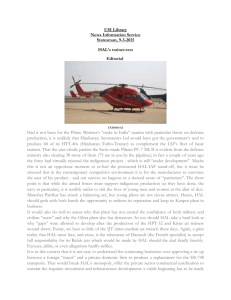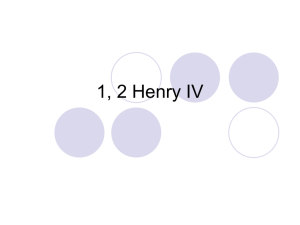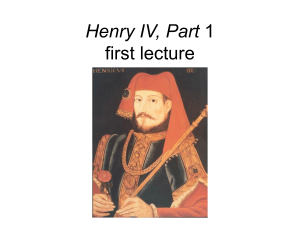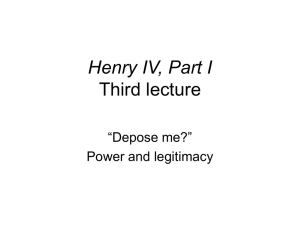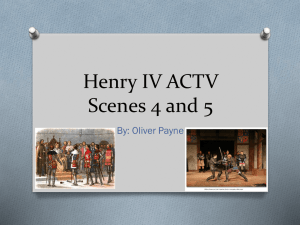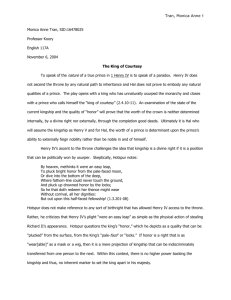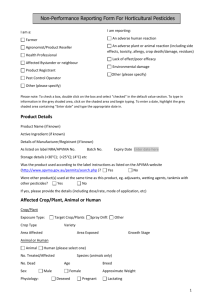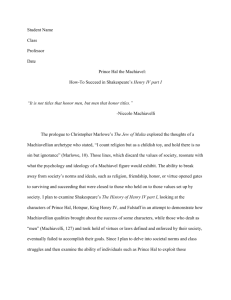Word - Murray State University
advertisement
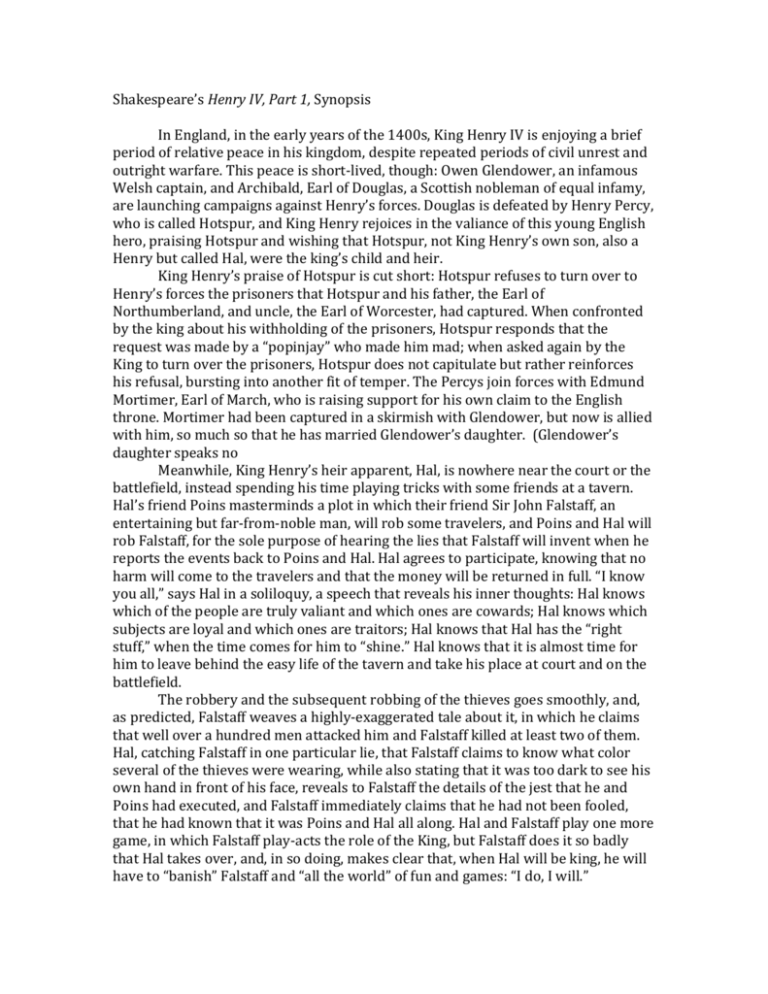
Shakespeare’s Henry IV, Part 1, Synopsis In England, in the early years of the 1400s, King Henry IV is enjoying a brief period of relative peace in his kingdom, despite repeated periods of civil unrest and outright warfare. This peace is short-lived, though: Owen Glendower, an infamous Welsh captain, and Archibald, Earl of Douglas, a Scottish nobleman of equal infamy, are launching campaigns against Henry’s forces. Douglas is defeated by Henry Percy, who is called Hotspur, and King Henry rejoices in the valiance of this young English hero, praising Hotspur and wishing that Hotspur, not King Henry’s own son, also a Henry but called Hal, were the king’s child and heir. King Henry’s praise of Hotspur is cut short: Hotspur refuses to turn over to Henry’s forces the prisoners that Hotspur and his father, the Earl of Northumberland, and uncle, the Earl of Worcester, had captured. When confronted by the king about his withholding of the prisoners, Hotspur responds that the request was made by a “popinjay” who made him mad; when asked again by the King to turn over the prisoners, Hotspur does not capitulate but rather reinforces his refusal, bursting into another fit of temper. The Percys join forces with Edmund Mortimer, Earl of March, who is raising support for his own claim to the English throne. Mortimer had been captured in a skirmish with Glendower, but now is allied with him, so much so that he has married Glendower’s daughter. (Glendower’s daughter speaks no Meanwhile, King Henry’s heir apparent, Hal, is nowhere near the court or the battlefield, instead spending his time playing tricks with some friends at a tavern. Hal’s friend Poins masterminds a plot in which their friend Sir John Falstaff, an entertaining but far-from-noble man, will rob some travelers, and Poins and Hal will rob Falstaff, for the sole purpose of hearing the lies that Falstaff will invent when he reports the events back to Poins and Hal. Hal agrees to participate, knowing that no harm will come to the travelers and that the money will be returned in full. “I know you all,” says Hal in a soliloquy, a speech that reveals his inner thoughts: Hal knows which of the people are truly valiant and which ones are cowards; Hal knows which subjects are loyal and which ones are traitors; Hal knows that Hal has the “right stuff,” when the time comes for him to “shine.” Hal knows that it is almost time for him to leave behind the easy life of the tavern and take his place at court and on the battlefield. The robbery and the subsequent robbing of the thieves goes smoothly, and, as predicted, Falstaff weaves a highly-exaggerated tale about it, in which he claims that well over a hundred men attacked him and Falstaff killed at least two of them. Hal, catching Falstaff in one particular lie, that Falstaff claims to know what color several of the thieves were wearing, while also stating that it was too dark to see his own hand in front of his face, reveals to Falstaff the details of the jest that he and Poins had executed, and Falstaff immediately claims that he had not been fooled, that he had known that it was Poins and Hal all along. Hal and Falstaff play one more game, in which Falstaff play-acts the role of the King, but Falstaff does it so badly that Hal takes over, and, in so doing, makes clear that, when Hal will be king, he will have to “banish” Falstaff and “all the world” of fun and games: “I do, I will.” The rebels during this time have consolidated their forces. Glendower, the wild Welsh commander, has married his Welsh-speaking daughter to Edmund Mortimer, a challenger to King Henry for the throne. Glendower and Hotspur, both obstinate and stubborn, lock horns at every turn. King Henry calls Hal back to court and refers to him, his own son and heir apparent, as the King’s “nearest and dearest enemy.” Hal, though, reassures his father that he is ready to join the battle and defeat the rebels. “A hundred thousand rebels die in this,” says the King, assured that Hal the prince will be fighting at his side to save their kingdom. Hal returns to the tavern to muster his friends for the battle: “The land is burning; Percy stands on high; And either we or they must lower lie.” Falstaff remarks, “Rare words! Brave world!,” but then turns to the tavern’s hostess to request his “breakfast.” As the rebels marshal their forces, Falstaff conscripts rich young men who, in turn, pay off Falstaff and send poor serving-men and out-of-work tradesmen to battle in their places. The King sends an envoy to the rebels offering them a kind of amnesty, and Hal offers to fight Hotspur one-on-one to save lives on all sides. Worcester, Hotspur’s uncle, refuses to tell Hotspur of the offer, afraid that Hotspur might accept it: Worcester wants nothing but war. Hotspur, ironically, makes the same offer that Hal did, but by this time, it is too late. King Henry’s troops use a well-known battle tactic, dressing several noblemen in the King’s attire and sending them into the battle. One of these noblemen, the good Sir Walter Blunt, is killed by Douglas, who brags to Hotspur of killing the King. Hotspur, who knows King Henry, sets him straight. On the battlefield, Hal asks Falstaff for his sword or pistol, only to find that Falstaff had stashed a bottle of sack in his holster. Hal throws the bottle at Falstaff and proceeds to save King Henry from the hands of Douglas, who then ignominiously runs away. Moments later, Hotspur confronts Hal, and Hal kills Hotspur. Falstaff, playing dead nearby, stumbles upon the already-dead Hotspur, ignobly stabs the corpse and picks it up, carrying it to Hal and Prince John, Hal’s younger brother, and claiming to them that he, Falstaff, had killed Hotspur in battle. “This is the strangest tale that ever I heard,” says Prince John, and Hal responds, “This is the strangest fellow, brother John.” The dishonorable Falstaff claims that he will continue to follow the princes, but his only motive is the hope of further “reward.” Hal asks King Henry for the privilege to “dispose” of the prisoner Douglas, the one who had run away. The King grants this request, and Hal immediately grants it to his younger brother, with the request that John release the coward. The King then gives commands for the three of them to pursue Glendower and Mortimer, that is, to finish the battle and secure the peace of their beloved kingdom. Synopsis and other information from Jonathan Bate and Eric Rasmussen, William Shakespeare: Complete Works (Modern Library, 2007)
